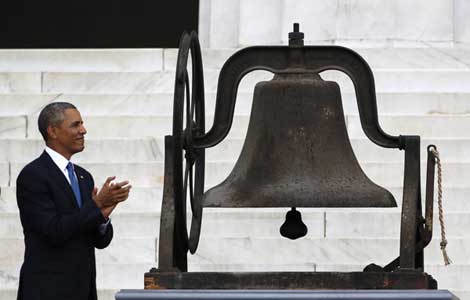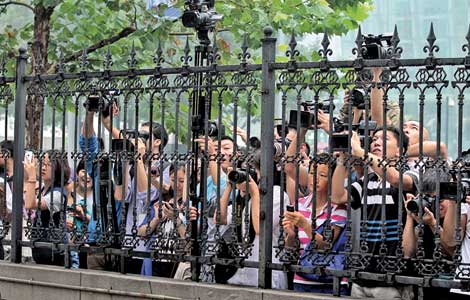Crime and punishment for corrupt officials
Updated: 2013-08-29 08:14
By Ji Zhebu in Beijing (China Daily)
|
||||||||
Sentencing criteria
With China's economy booming in recent years, the money on offer to corrupt officials, especially those at a high level, can be as much as several million yuan or even hundreds of millions of yuan.
"The 100,000 yuan threshold is already out of date," said Zhao Bingzhi, dean of the College for Criminal Law Science at Beijing Normal University.
"As far as I know, the legislation department has already noticed it (the anomaly) and an amendment is on the agenda," said Zhao, who is also chairman of the Institute of Criminal Law under the China Law Society
"The public may think that the death sentence is the only one corrupt officials deserve, but scrapping the death penalty is a big trend across the world. In the long run, the death penalty for both bribery and embezzlement should be abolished. And I don't think the death penalty is the most effective way of punishing corruption; if it were, we wouldn't have so many corrupt officials today," he said.
"The effectiveness of punishment not lies in its cruelty and mercilessness, but in the inevitability of being caught. We should extend the supervision network," he added.
Zhao's words were echoed by Hu Xingdou, a political analyst and professor of economics at the Beijing Institute of Technology.
"The primary focus of China's anti-corruption efforts should be on prosecuting more corrupt officials, rather than sentencing more officials to death. If the number of prosecutions is too low, corrupt officials will not be intimidated by the law - even if those who are caught face the death penalty - because they all think that luck will eventually favor them," Hu said
Lawyer Liu Xiaoyuan urged the Supreme People's Court to make the existing sentencing criteria available to the public.
The general public usually takes the amount of money embezzled by corrupt officials as the only criterion, so sometimes the differences in the sentences cause confusion.
For example, in 2007, Zheng Xiaoyu, former director of the China Food and Drug Administration, was sentenced to death for accepting 6.49 million yuan in bribes and for dereliction of duty. In July, Liu Zhijun, the former railways minister, received the death sentence with a two-year reprieve for taking 64.6 million yuan in bribes and for abuse of power. In 2009, Chen Tonghai, former chairman of Chinese oil giant Sinopec, was given a suspended death sentence after being convicted of taking 195 million yuan in bribes.
Ren Jianming, director of the Clean Governance Research and Education Center at Beihang University in Beijing, said the sentences handed down to some high-profile corrupt officials in recent years were "reasonable".
"A court sentence is handed down after consideration of many factors, including the severity of the case, the damage done to society and whether the criminal has made a full confession or has any extenuating circumstances," he said
Zheng Xiaoyu was executed, because food and drug safety is closely connected with public health, while Xu Maiyong and Jiang Renjie - two low-level local officials executed for corruption - received the death sentence because they had embezzled record amounts for the time.
"Sometimes, judges also feel under pressure when handing down a death penalty for financial crime because of the growing movement against capital punishment," said Ren.

 US vows action in Syria even without UN backing
US vows action in Syria even without UN backing
 Li Na advances to 3rd round
Li Na advances to 3rd round
 Obama, marchers mark 50 yrs since King's speech
Obama, marchers mark 50 yrs since King's speech
 Singers' son pleads not guilty
Singers' son pleads not guilty
 Rubber duck to float in Beijing
Rubber duck to float in Beijing
 New York Times, Twitter hacked by Syrian group
New York Times, Twitter hacked by Syrian group
 Five apps to help you 'breathe' in Beijing
Five apps to help you 'breathe' in Beijing
 Wozniacki survives battle with Chinese qualifier
Wozniacki survives battle with Chinese qualifier
Most Viewed
Editor's Picks

|

|

|

|

|

|
Today's Top News
China, US officials discuss defense ties
Envoy to seek release of US citizen
China leads the way on multilateral defense co-op
Bond trial program set to expand
China set to lead e-commerce market
US vows action in Syria
Firms 'must foster' jobs abroad
5-yr work plan to fight graft unveiled
US Weekly

|

|







